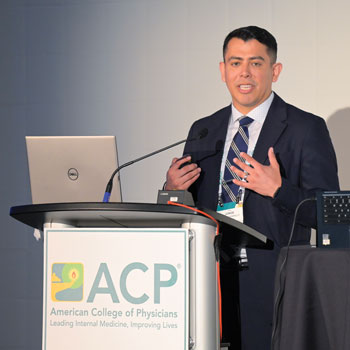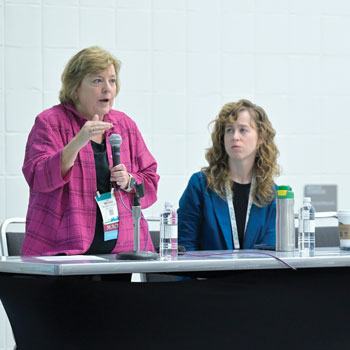The importance of humanity in internal medicine
It is never easy for a physician to cope with the death of a patient, but it is a reminder of why doctors practice medicine, especially internal medicine.
I recently attended the funeral of one of my long-time patients, who had required hospice care after a long battle with heart disease. Many of us have had the experience of telling a patient and their family that their disease has progressed and we have reached the limits of medical science.
In training, we are taught to be compassionate but professional, maintaining a certain level of emotional detachment so as not to cloud our objective judgment and our need to advise our patients to the best of our ability. Despite that requirement, we must also remember that there is a need for human connection and compassion in those moments, as patients are desperately seeking comfort and guidance and are often terrified of what comes next. As internal medicine specialists, we have the awesome responsibility and privilege to be the doctor for our patients through decades of their life experiences and to offer them not just medical science, but also humanity and comfort.
The longevity of the relationship between the internal medicine physician and their patient is not always appreciated in other aspects of the medical field, and we should always keep it as a guidepost for our practice. Many know that the three principles of my presidency are advocacy, humanity, and diversity. Last month, I spoke of the importance of advocacy and the role we play as physicians and patient advocates, and this month I will address the importance of humanity in our role as internal medicine physicians.
One of the greatest acts of charity a person can perform is to attend someone's funeral, as it is the only act of kindness that cannot be reciprocated. This patient had been in my practice for almost two decades, and I had the privilege of taking care of both her and her husband. Over time, a bond forms with patients as we learn not just about their medical conditions and illnesses but about their lives, stresses, goals, wishes, and passions. This bond reminds us that we are not only treating a disease but also, first and foremost, taking care of a person who has a disease. Our patients' humanity is paramount. Patients' daily interactions and experiences exist before the exam room and will continue after the exam room. They allow us a small glimpse into their lives, and we should do well to remember that this is a privilege.
After many attempts at mitigating this patient's progressive disease, after she had repeatedly beaten the statistics, the time came to sit with her and her husband and discuss end-of-life care. It was difficult for a woman in her late 60s to accept, and she was not nearly ready, but she was determined to leave the world with the same joyful spirit with which she lived. Keeping in close contact with the family daily, being available for questions, and being responsive to the needs of hospice care afforded me the opportunity to mitigate the stress and anxiety the family was feeling. When my patient's husband invited me to attend her funeral, I knew I would go, but I must admit to some hesitation, as my years of training and objectivity sought to place those professional boundaries between doctor and patient.
At the funeral, during the sermon, the rabbi spoke of the patient's life and spirit and how she was finally free of the suffering she had been enduring these many years. He spoke of how the family came to accept the last days of her illness and had time to spend with her in comfort and compassion. When he called me out in front of the congregation to thank me on behalf of the family for providing them with the care and compassion they needed, I was filled with mixed emotions. What I realized at that moment, with profound clarity, was the true role we play as healers. The need to cure disease, make the correct diagnosis, and deal with the minutiae of administrative burdens, prior authorizations, and many other aspects of our profession pale in comparison to what patients truly need: the warm, caring, and compassionate touch to let them know that they are more than their disease, and that they matter. As the saying goes, nobody cares how much you know until they know how much you care. The physician is that healer who provides the comforting touch throughout the patient experience. It is a reminder of the importance and nobility of that sacred relationship and the influence it can have on the patient and their family.
As I reflect on this experience, I fully realize that internal medicine, of all disciplines, is best suited to navigate all aspects of a patient's care. As specialists of complexity and continuity, we are able to establish longitudinal relationships that firmly cement the bonds of physician and patient and allow us to be not only healers of patients' physical ailments but a salve to their aching spirits. The patient's story, and not just their history and physical, is as important as any other aspect of medical care. It is this acknowledgment of the patient's humanity that completes the patient encounter and should be a clear reminder of why we are in this noble profession.
While it is never easy for a patient to pass, it is a reality of human existence and a reminder of why we practice medicine, especially internal medicine, in the first place. The way we show up for our patients to help them transition to end-of-life care may be the most important gift we can give them and their families. For myself, this recent experience will have a lasting impression on me and be a reminder to always embrace the humanity of our patients, no matter what stage of our career, and keep compassion ever present in all that we do. For my patient, and for all those who have passed, may her memory be for a blessing.




